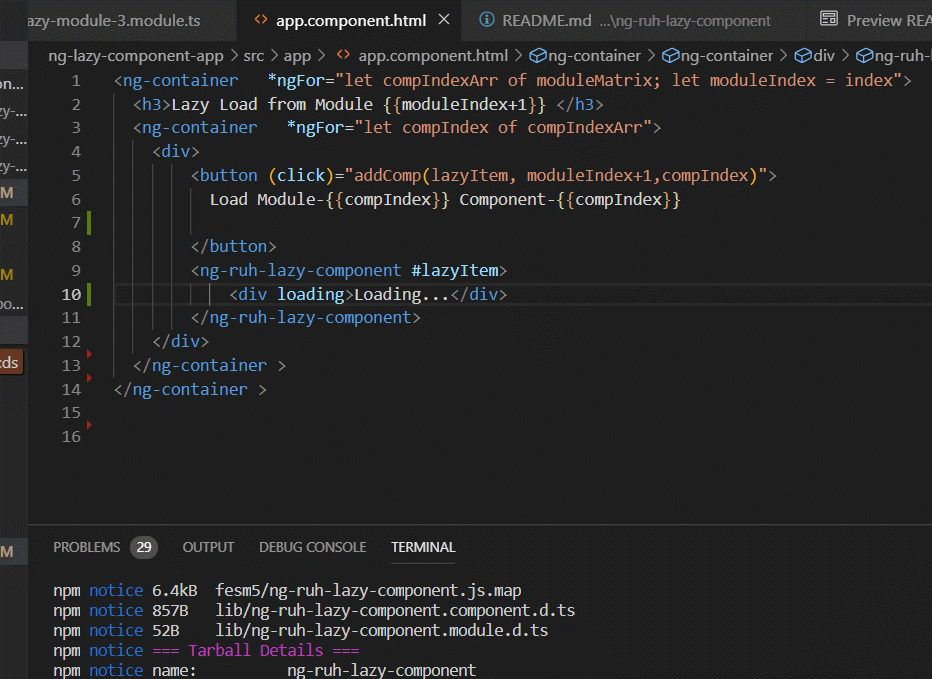ng-ruh-lazy-component
v1.0.1
Published
A simple utility to lazy load components into angular without routing dependency.
Downloads
7
Maintainers
Readme
NgRuhLazyComponent
A simple utility to dynamically lazy load components into an angular app without routing dependency.
- Much inspiration drawn from https://netbasal.com/the-need-for-speed-lazy-load-non-routable-modules-in-angular-30c8f1c33093 and https://medium.com/@esanjiv/complete-beginner-guide-to-publish-an-angular-library-to-npm-d42343801660
Demo Screen

Benefits
- Reduce your inital app load time by loading only the essential components first
- Reduce the initial payload size
- Leverage lazy loading features WITHOUT routing dependency (Not all apps are route based )
- Ideal for apps that need to build dynamic UIs defined via JSON configs or based on user driven highly customizable UIs
- Prevents unnessasary memory hogging by loading only what is required
Usage
On app.module file import the module
import { NgRuhLazyComponentModule } from 'ng-ruh-lazy-component'; //<-- Add this line
@NgModule({
declarations: [
AppComponent,
],
imports: [
BrowserModule,
NgRuhLazyComponentModule //<-- Add this line
],
providers: [],
bootstrap: [AppComponent]
})
export class AppModule { }- On anywhere in your component templates add the following
<ng-ruh-lazy-component
componentPath="src/app/modules/lazy-module-1/lazy-module-1.module#LazyModule1Module#Comp1Component"
[data] = "dataToPushToLoadedComponent">
<div error>There was a problem loading the component</div>
<div loading>Loading Component, Please stand by</div>
</ng-ruh-lazy-component>
componentPath: should take the format of<Path to .module file>#<Name of the module>#<Component Key>data: data To Push To Loaded Componenterrordirective (Optional) : Allows you to specify html to show when an error is encounteredloadingdirective (Optional) : Allows you to specify html to show when the module is loading
Prerequisites
The smallest unit of Angular code that could be lazy loaded is an Angular Module (NGModule) and NOT a Component, Hence ALWAYS make sure you create a module that encapsulates one or more of the Components you need to reload.
- Create your module, use
ng g m modules/lazy-module1 - Create 1 or more components under the module, use
ng g c modules/lazy-module1/comp1,ng g c modules/lazy-module1/comp2 - on the
modules/lazy-module1/lazy-module1.module
@NgModule({
declarations: [Comp1Component, Comp2Component],
entryComponents: [Comp1Component, Comp2Component], // <-- Add this line
imports: [
CommonModule
]
})
export class LazyModule1Module {
static componentMap = { // <-- Add static property componentMap
"Comp1Component" : Comp1Component, // to map the string component key with
"Comp2Component" : Comp2Component // the actual component ref
} // you can also add a function named getComponentEntry(compType:string)
} - On your
angular.jsonon the project root, add the module path the thelazyModulesarray in theproject.<your-app-name>.architect.build.options.lazyModules
project:{
<your-app-name>:{
architect:{
build:{
options:{
lazyModules:[
...
'<path to .module file(s)>',
'src/app/modules/lazy-module1/lazy-module1.module',
...
]
}
}
}
}
}- Follow above steps for each module that need to be lazy loaded
